The Young Men of Lubeck: A Europa Universalis 4 Walkthrough
An in-depth examination of the latest iteration of UE4

On September 13th, Paradox Interactive released Lions of the North, the 19th premium expansion for its flagship title Europa Universalis 4, along with its 34th major patch. The expansion is focused on the Baltic region, adding new mission trees and events for the Scandinavian nations, the late crusader states, and Poland. Meanwhile, the patch (known internally as the Sweden patch) makes a number of adjustments to the order of combat, adds new monuments, rebalances the idea groups and - most significantly - expands the government system.
Back in 2018, the devs massively overhauled the government system to give it more flexibility. Rather than passing through a series of tech-linked government upgrades, the player instead selects from a series of reforms, with smaller, more insular nations tending to reach those reforms faster than large, expansionist ones. Unfortunately, the system had a few shortcomings. Most nations would hit the last reform tier by the mid-game at the latest, and thereafter the reform system served little purpose. What's more, people tended to pick the same reforms each time - usually the ones that give an income boost.
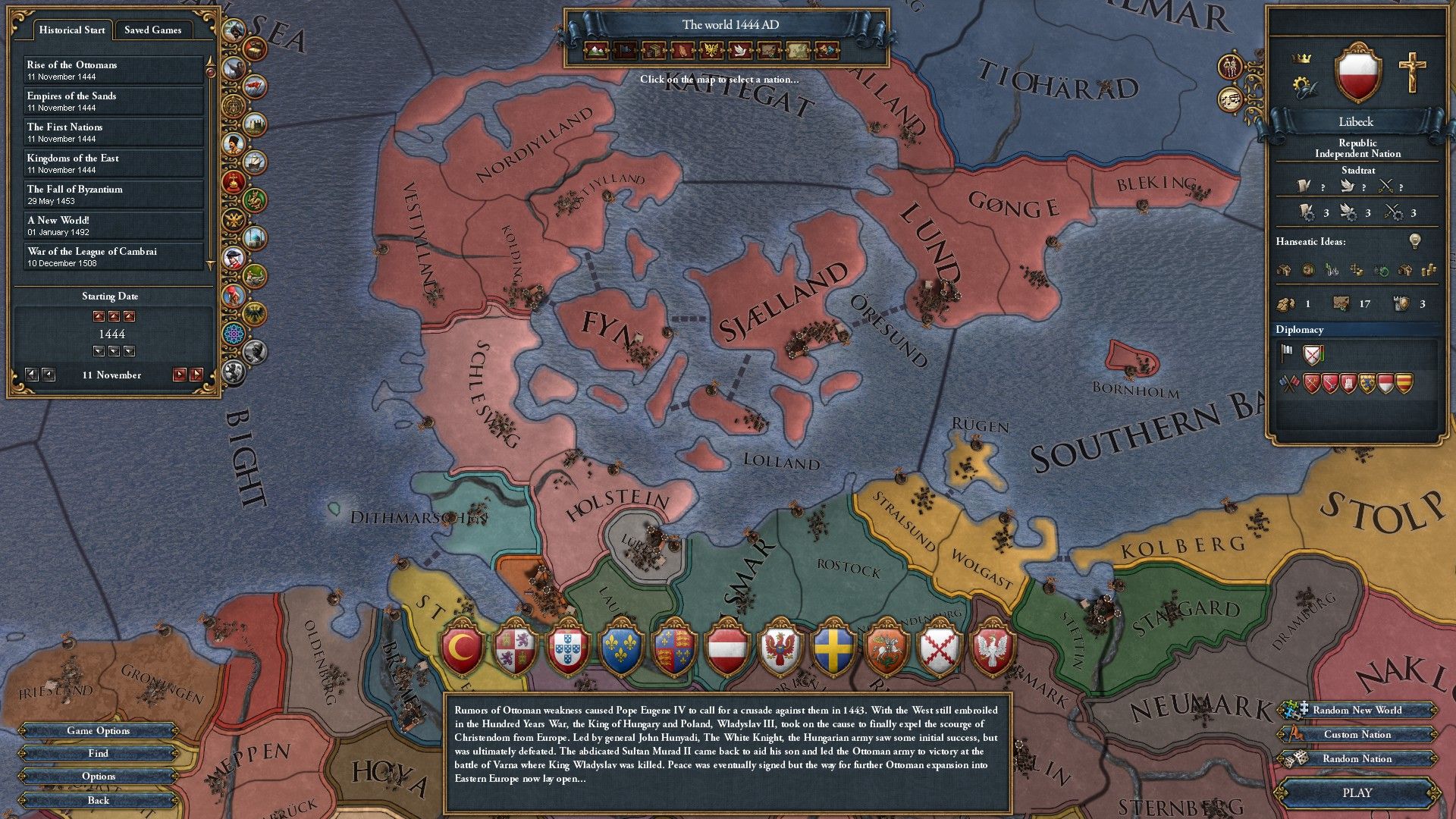
Does the new system add the desired variety and depth? Let's take a look together as we play through an unexpected addition included in the free patch: Lubeck, a tiny Germanic city state on the Baltic coastline. Free content for individual countries is rare, and this one promises to be an interesting challenge.
Historical Background
Today a mid-sized city in northern Germany, Lubeck was historically an imperial free city - a division of the Holy Roman Empire that answered solely to the Emperor himself. Beyond that, Lubeck was also the wealthiest and most powerful member of the Hanseatic League, a coalition of guilds which controlled trade along the Baltic Sea. In its heyday, the Hansa enjoyed a monopoly on trade in northern Europe, bestowing massive wealth upon its members.
But as the early modern era dawns, the influence of the Hansa is waning. Denmark - leader of the Kalmar Union and thus de facto ruler of Scandinavia - has claimed complete control over the Oresund Sound that separates the Baltic Sea from the Atlantic Ocean. The Danes have used this position to enact a series of heavy tolls that have propped up their economy at the expense of the Hansa.
If we are to restore the glory of the Hansa, we will have to find some way to deal with Denmark while maintaining and expanding our grip on the Baltic coastline.
Gameplay Overview
Lubeck is a one-province minor nation, or OPM. It begins as the leader of a trade league, a coalition of OPMs that transfer their trade power to Lubeck in exchange for protection and some economic benefits. Between this, Lubeck's trade-focused national ideas and the fact that its one province is an important port, Lubeck has a disproportionately large amount of control over the flow of trade.
Despite its size, Lubeck has the potential to become fantastically wealthy due to its influence over the valuable Lubeck trade node, the economic heart of central Europe. Unfortunately, we are competing for control of the node with Denmark. Our position in the HRE (where we are, contrary to history, not a free city) means that Denmark will be reluctant to attack us, but we also have no hope of defeating Denmark in its current state.
Our initial goal is to rebuild the Hansa, adding members to our trade league with an eye toward expanding into the European interior. For the most part we can do this diplomatically, but we will eventually come into armed conflict with Denmark over control of the Lubeck node. This will be a lot easier if we can help our fair weather ally Sweden break out of the Kalmar Union and declare independence.
Regardless of what happens with Denmark, we will want to take steps to control trade in Germany and the North Atlantic, while also doing what we can to prevent England (and, eventually, the Netherlands) from stealing our trade. If we succeed, we'll have enough money to do just about whatever we want.
1444 AD - The Opening Play
Step one is to examine Lubeck's new mission tree, which is going to be critical for a country as tiny as Lubeck.
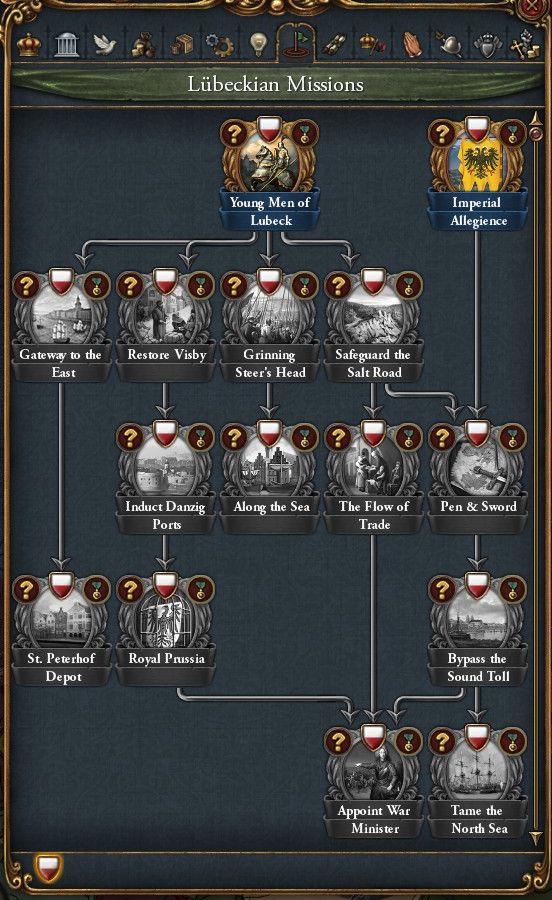
There are five missions available to us from the start:
- Young Men of Lubeck: Build up my army to the force limit (the soft cap on army size)
- Imperial Allegiance: Increase our relations with the Holy Roman Emperor and hire a diplomatic advisor
- Expand the Altstadt: Construct a marketplace and increase development in Lubeck
- Expand the Admirality: Build up my navy, hire a naval advisor and/or construct a dock
- Organize Hanseatic Diets: Unlock three government reforms and have good relations with all of my trade league members
"Young Men of Lubeck" is the most immediately important as it grants us claims on a lot of our neighbors. As a duchy-tier nation, Lubeck only has two diplomats by default, and they'll be busy boys - far too occupied with acquiring allies and pulling countries into our trade league to waste time fabricating claims. Those claims will give us two main directions to expand: South into Saxony, and east along the Baltic coast.
This mission also features a recent theme in EU4 mission trees: Dynamic rewards that vary based on how the mission is completed and/or the conditions in our country once it's completed. This one is pretty trivial (we'll get a manpower bonus that scales to the size of our trade league), but there are more interesting ones deeper in the tree.
Trading Strategy
Of course, conquest is going to be a tall order given Lubeck's size, but we have one big advantage: Our trading might. Trade is one of the more impenetrable mechanics in EU4, so it's worth taking a minute to look at what we're trying to accomplish and how.
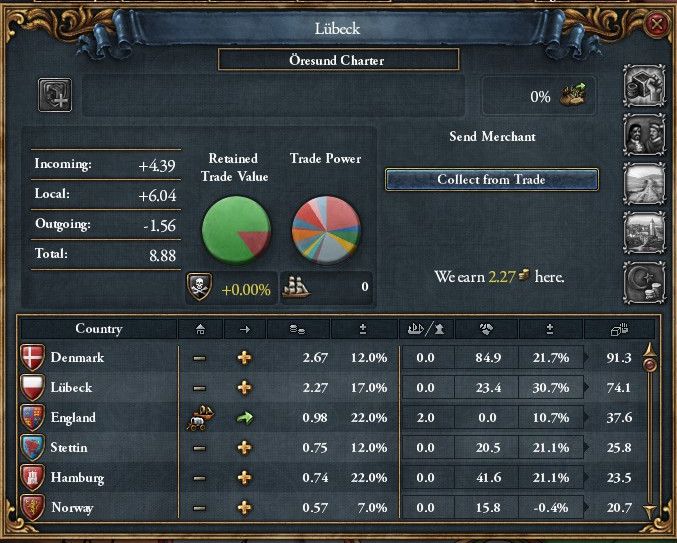
This is the trading interface. Lubeck is in the node of the same name, and currently controls 17% of the trade in that node. Our initial objective is to gain as much power as we can in that node, and while there are many ways to do this, the most straightforward is by capturing land. Each province belongs to a certain node and provides a certain amount of trading power - usually very little, but trade centers are worth more. If we want to control the Lubeck node, we want to hold as much land as we can within it.
The Lubeck node covers Denmark, parts of Sweden and Norway, and the northern part of the Holy Roman Empire. Fortunately, most of our new claims are on land in that node, so we will be increasing our control as we expand.
Long-term, we will also want to maximize the value of our node. Lubeck has the potential to become the world's most valuable trade node, but we have to play our cards right.
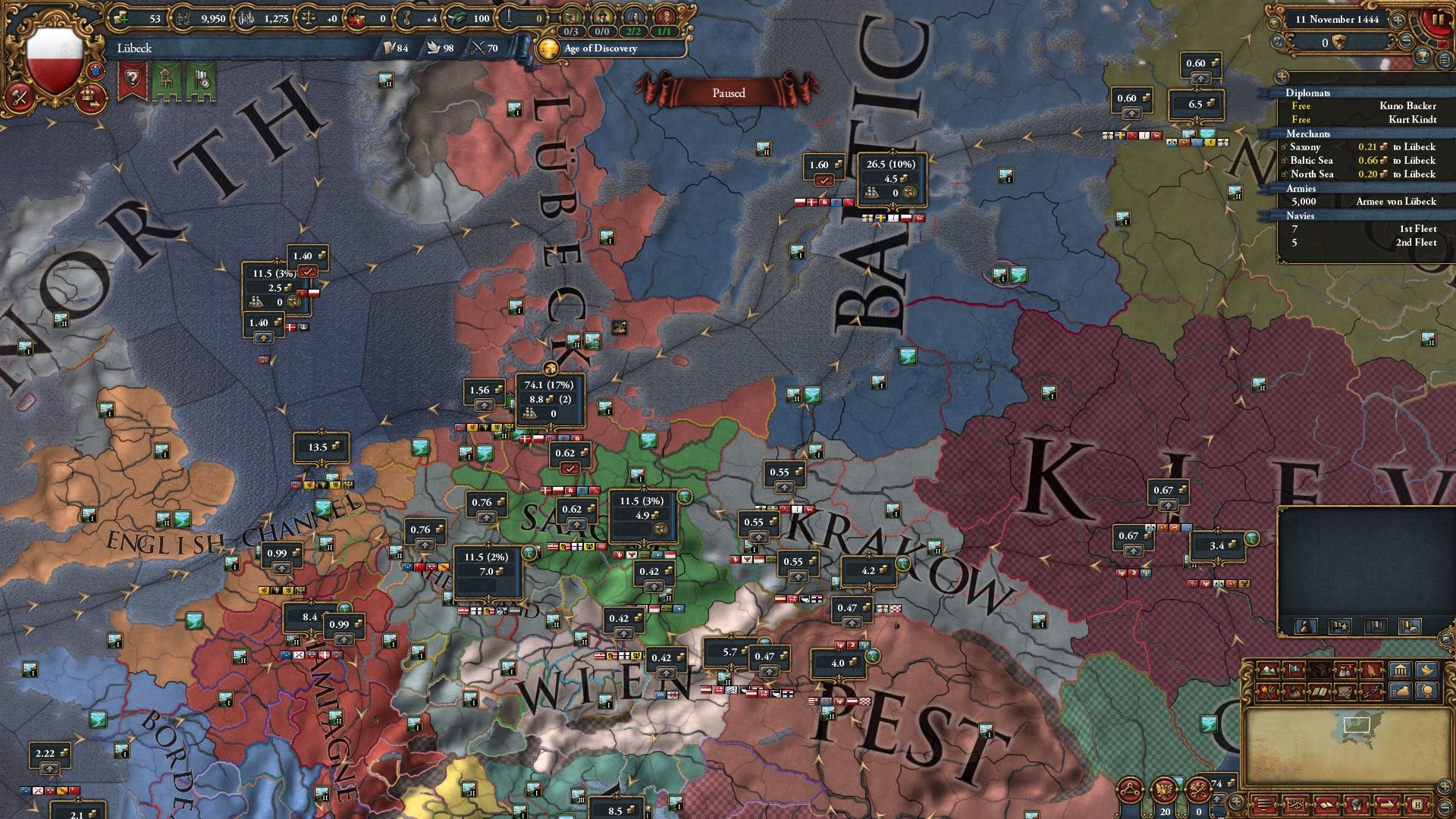
Trade nodes are interconnected, with five linked to the Lubeck node. Four of those are upstream nodes that send trade to us, and they are geographically dispersed - running from Scotland to the Rhine. We also want to have as much power in those nodes as we can, as we can steal their trade and direct it to ourselves. We also have one downstream node - the English Channel node, which includes England, northern France and the Low Countries. Whoever controls that node (almost certainly England) will try and do the same thing to us, so we would be wise to prevent them from gaining any trade power in Lubeck.
The good news is that Lubeck is a trade juggernaut, with a lot of bonuses to bolster everything from our trade power to our trade income to our ability to manipulate trade. Once these bonuses are in full effect, we'll be able to dominate a node without having to own much territory.
1468 AD - Early Expansion
Less than a decade and a half in, we've prosecuted three successful wars and grown from one province to seven.
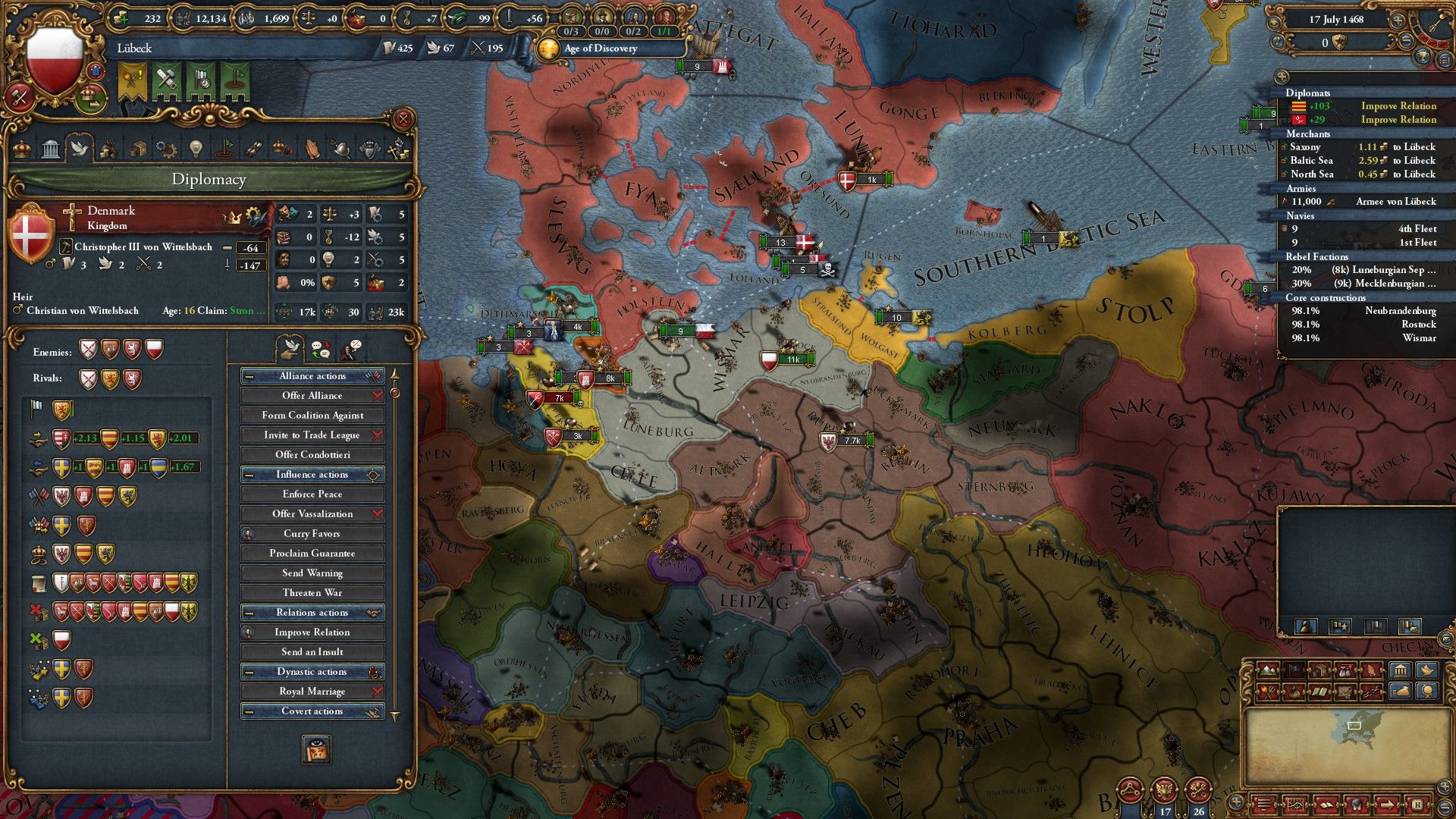
As a tiny nation, alliances are the key to growth. Our trade league benefits our coffers but we can't call the other city-states in to offensive wars, and the tiny nations in our orbit are of limited value as allies. The key is to find an ally larger than our prospective targets, yet small enough that it will agree to the alliance. Brandenburg fits the bill here. Between Brandenburg and two other OPMs, we have enough might to conquer our neighbors.
Early wars are essentially arm wrestling competitions - the side with the most soldiers will almost always win. The real problems start after the war is won.
There are a few special challenges to expanding as a tiny country. Even a quick war can completely tax our manpower reserves, and we don't have enough troops to deal with separatist uprisings. As such, we'll have to wait a lot longer between wars than a major kingdom would. With unrest in Lubeck through the roof, we're going to have to tap the brakes and refrain from further conquest until everything has settled down.
Fortunately, there's plenty to do while we're at peace. I build up our relations with Austria, the current Emperor of the Holy Roman Empire. This completes a mission, but it also makes it less likely that the Emperor will demand that we return unlawful territory, a constant problem when expanding within the HRE. I also add a few more OPMs to our trade league, namely Riga and Gotland - each of which completes another mission. Right now it's easy to recruit countries into the Hansa, but the larger the league, the harder it will be to recruit new members.
Our expansion has also made us big enough to set Denmark as a rival. This is strictly optional, and in fact it will cut us off from a diplomatic alternative to resolving the Oresund Sound dispute. Given that I plan on expanding into Danish territory, I opt to forego diplomacy this time. While we won't be ready to go to war with them for a good long while, this puts us on a path to dominating the Lubeck trade node.
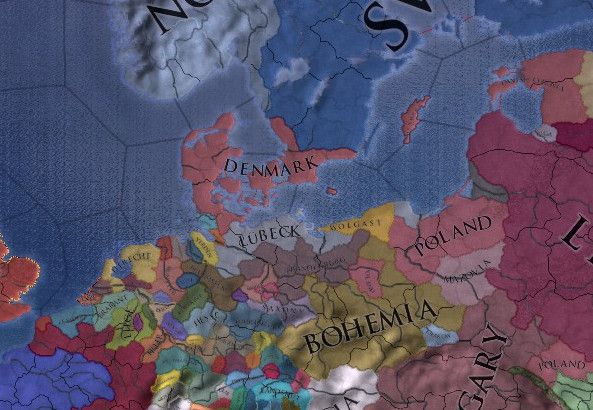
1508 AD - Gearing Up For War
As the age of colonialism begins, the world is looking a bit askew. Both Hungary and Bohemia have stayed independent of Austria and grown significantly, limiting the power of the Hapsburgs. Meanwhile, Scotland - with French assistance - has advanced into the Midlands, putting England on the back foot. And in northern Germany, tiny Lubeck has expanded to more than ten provinces and gained plurality control over the world's most valuable trade network.
This is where expansion becomes difficult. Our neighbors are still pretty weak, but they are large enough to enjoy alliances with major surrounding countries - namely France, Burgundy, and Denmark. Sadly, Lubeck doesn't have any allies of equivalent might right now, so we have to be a little tricky. The easiest way to get around an alliance is by attacking a minor ally of the target country, thus dragging them into the war as well. This cheap trick has enabled us to carve off part of Wolgast as we advance toward Prussia.
However, finishing the conquest of Wolgast means going after them directly, and this brings us into direct conflict with Denmark for the first time. This proves to be a very humbling lesson. Leaving aside its allies and partners, Denmark still fields a larger army than me. They also have a navy that I can't even touch, which is going to be a problem given that our long-term goal is to capture Sjaelland, an island.
We have a big advantage, though - we're positively loaded. Our control over the Lubeck node is giving us a surplus of 10-15 ducats per month, far higher than most of Europe at this point in the game. This healthy income lets us safely exceed Lubeck's puny force limit, and I'll be merrily fielding an army larger than I should for quite some time.
Even with this significant wealth, we're not ready to invade Denmark just yet. For one thing, the Reformation is starting, and we'll definitely need to deal with that first. There are a lot of benefits to converting Lubeck to Protestantism, but it also drops our prestige by a whopping 100 points - potentially breaking our trade league if that pushes our prestige under -50. It would also help if we can spur Sweden into an independence war, but they've tried and failed already, so this will have to wait until we've weakened Denmark a bit.
1524 AD - The New Year's War
January 1st marks my first attempt to invade Denmark directly. It's not a decision I made lightly, nor without planning. I have two powerful allies - Bohemia and Muscovy - and a 1500 ducat war chest to carry me through what I'm anticipating to be a long war.
The war lasts three years and while I technically emerged the victor, it was a definite Pyrrhic victory. I succeed in fully capturing the northern coastline and complete a mission I've been working on for ages, but doing so costs me tens of thousands of lives and nearly depletes my war chest. Even with money for mercenaries, Denmark's superior manpower reserves made the protracted war very painful.
In strategy games as in real life, there's a definite downside to having an economy based on trade: It's very vulnerable during wartime. By blockading my coasts with their powerful navy, Denmark managed to turn my surplus into a deficit, a problem I wouldn't have had (at least to the same extent) if my wealth were primarily internal.
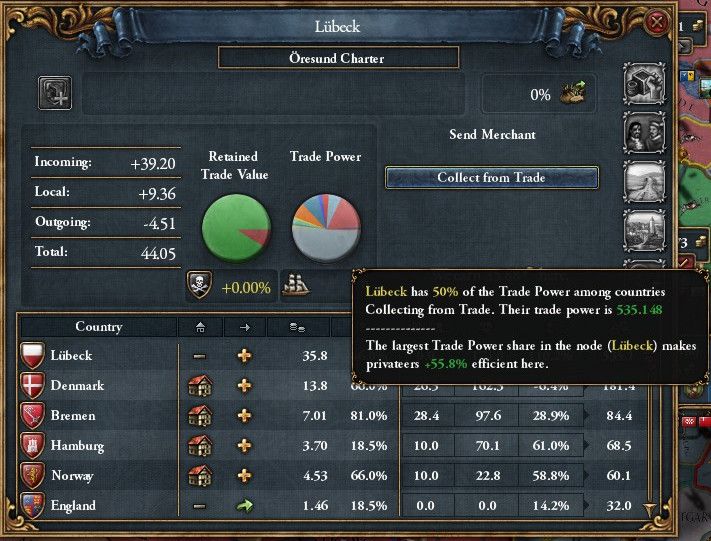
On the other hand, while we occupied Danish territory, we did manage to wrench enough trade power from them to control the Lubeck trade node. Fragile or not, the wealth that we stand to make from dominating and developing this node is awe-inspiring. We're just going to need a better navy to secure it.
1583 AD - The Fall of Denmark
With Europe consumed by the Religious League Wars, Sweden makes a move for independence with Lubeck's help.
Expanding as a small state is often a waiting game. You twiddle your thumbs and look for an opportunity to strike. The 1570s were, on the surface, not a great time - as the unwitting head of the Protestant League, I immediately lost all of my allies on the other side, including Bohemia and Russia. Compounding the problem is that I had no desire to participate in the League Wars, something that would only benefit me if I wanted to try and become Emperor.
On top of that, the League War was clearly going to be a loser - though Brandenburg, the head of the League after my departure, saw things differently. Just like that, Europe descends into a massive, ugly war.
If you're not a participant, the League Wars present both an opportunity and a challenge. Anyone involved will be ripe for invasion, but you can't rely on your own allies as anyone fighting in the League War will probably refuse a call to arms. But as the war winds down, the wear on the participants opens them up for opportunistic attacks.
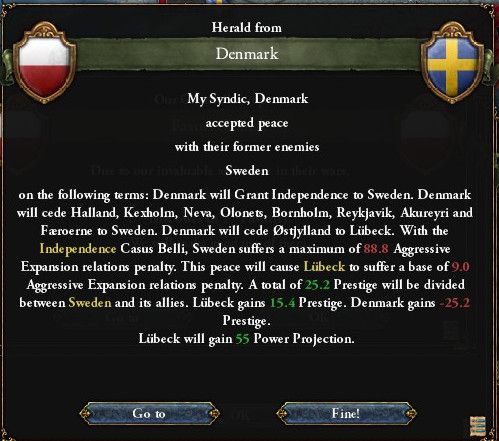
Sweden took that opportunity. The independence war takes five years, but with the bulk of Denmark's forces deep inside the Empire and their manpower depleted, they can't put up much resistance.
The Swedish independence war is a turning point. We've built up a substantial fleet of heavy ships that is finally capable of overcoming Denmark's greatest strength. And with Lubeck enjoying control not just of its own node but all four upstream nodes, we have enough wealth to field an army far greater than our size would suggest.
During the long truce, I take some time to work through the non-military side of Lubeck's mission tree. The reward at the end - the consolidation of the Hansa - is tempting, but getting there is an absolute pain. Many of the objectives have very specific requirements (such as having a specific high-level advisor or even having an admiral with certain stats) that are down to luck.
One thing you can control are your leader's stats. Several missions demand that Lubeck have a leader with high stats that (provided you opt to stay a republic) will require several consecutive reelections. There are a few things to keep in mind as you work through the tree: Make sure that you have enough republican tradition to compensate for the reelection cost (you will lose your trade league if you collapse into a dictatorship) and only reelect young leaders, as you don't want your president to die in office before completing the mission.
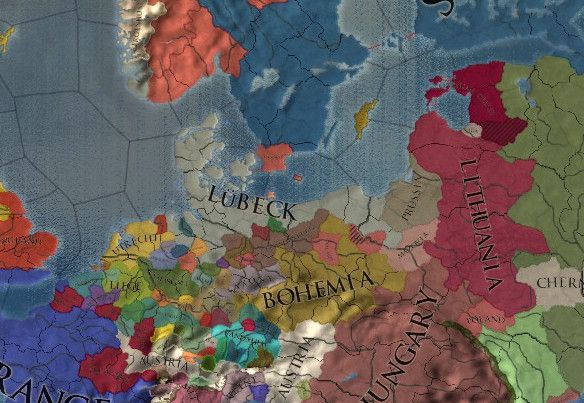
1617 AD - The Hansa Ascendant
With the conquest of Jutland and Sjaelland, the Oresund Sound is firmly under Hanseatic control. There is no longer anyone in the Baltic region who poses a meaningful threat to Lubeck's trade or well-being. Even the Holy Roman Emperor is just an annoyance now.
And with that, there's only one thing left to do:

Lubeck's final mission unifies the region under our control, changing our name to "Hanseatic League," giving us new, more powerful ideas, and converting our entire trade league into subjects. This does mean that we lose a little bit of trade steering (though we can always start a new league and the Hansa ideas have a steering bonus, so it's not a such a big deal), but it also immediately makes us a great power.
The immediate aftermath is rough to say the least. We now have a dozen subjects, and while the game is nice enough to give us extra relations slots to keep our diplomatic power from going negative, it's clear that we need to annex most of them. Unfortunately, doing so is going to wreck our reputation, especially within the HRE. It'll take over a hundred years to fully consolidate this territory, but the rewards for doing so are certainly substantial.
Once that's done, we have a few options for expansion. Lubeck/Hansa is eligible to form Germany, so we can press further south and try to dismantle the HRE on our road to Italy. But that's an objective for another day - I've set out to do what I wanted to do.
What About That Reform System?
I haven't really talked that much about the new government reforms in this guide, but behind the scenes they've been playing a sizable role.
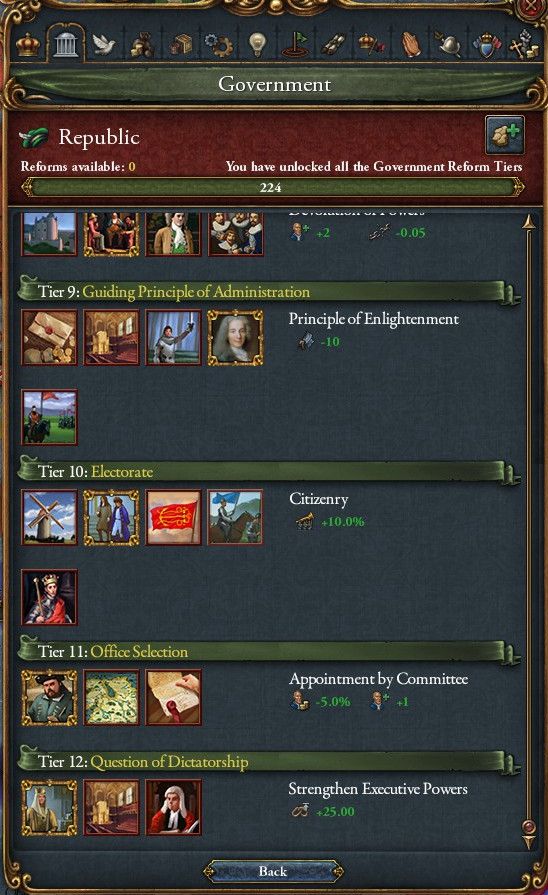
All government types have expanded reforms - republics, as you can see, have twelve. This includes some shared tiers - the choice to expand or curtail the powers of the nobility is now met with similar decisions for the other two estates. The choices are far more impactful as well, with many adding new mechanics or profoundly changing existing ones, and there's a lot more variety.
The catch is that it's going to take longer to unlock all the reforms, especially for a large empire that may need to spend some reform points to keep growing its governing capacity. This makes certain random events that exact a penalty in reform points feel a lot more impactful as well. To mitigate this, there are bonuses to increase the rate at which points are gained. Most notably, the tax bonus for having high crownland has been replaced with a reform point growth bonus, doubling the growth rate at 100% land ownership (which, with certain mid-game reforms, is not so hard to achieve).
Overall, this is a significant improvement to the reform system. What was once just a way to get some extra income and governing capacity now feels strategically important. If you're returning to EU4, be prepared to keep reforms in mind when sketching out your plans.
